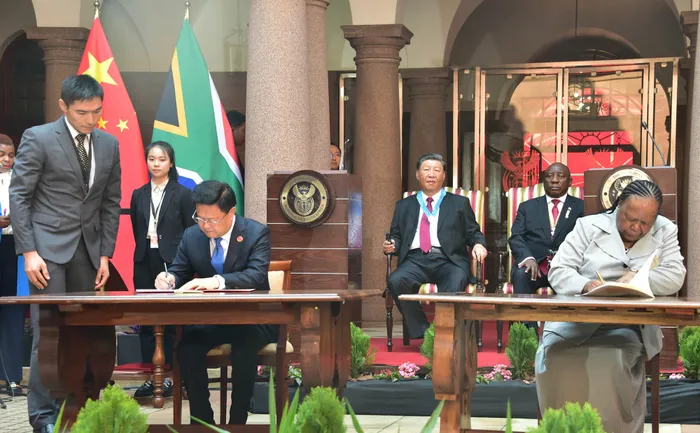South Africa-China relations face criticism

Picture: Fikile Marakalla / GCIS / Taken on August 22, 2023 – President Cyril Ramaphosa of the Republic of South Africa and President Xi Jinping of the Republic of China observe the signing of Memorandums of Understanding between their governments in the field of co-operation in Green Energy, enhancing co-operation in Science, Technology and Innovation, in the field of Higher Education and Training, requirements for the export of Avocados from South Africa to China, promotion of direct investment, strengthening investment co-operation in digital industrialisation, deepening Blue Economy co-operation, Green economic and industrial development and on special economic zones and industrial parks. China is an important investor in South Africa and provides support on infrastructure development projects including the Small Harbour Development Project, the TVET refurbishment project and the Mzimvubu Water Project, all of which are instrumental in job creation.
By Sarah Ntlemo
South Africa and China’s diplomatic and economic ties have grown significantly, boosting co-operation in trade, infrastructure development and investments. However, beneath the surface of this connection, there are a number of worries and objections that raise concerns about the relationship’s possible detrimental influence.
These concerns include the trade imbalance, labour practices and job displacement, environmental consequences, financial stability and debt burden, dependency and sovereignty issues, competition with local businesses, social tension, cultural tensions, and political controversies.
The significant trade deficit between South Africa and China is one of the sources of concern. South Africa, a major raw material exporter, frequently imports a large number of manufactured goods from China. This trade discrepancy has created economic vulnerabilities, with South Africa relying significantly on Chinese imports, raising questions about the long-term viability of this economic dynamic.
The influx of Chinese goods into the South African market, often at reduced rates, has been connected to probable job losses in particular industries. Additionally, claims of questionable labour practices in Chinese-owned firms in South Africa have generated concerns about worker treatment and the impact on local employment opportunities. China is not considered as strong on human rights, therefore as the bilateral relations between the two countries grow, it is vital to protect workers human and labour rights in South Africa.
China’s large-scale infrastructure projects launched in South Africa, particularly in mining and electricity, also raise environmental concerns. Critics have cited the possible negative effects on local ecosystems, water supplies, and air quality as examples of the environmental cost of economic expansion.
China’s support of major infrastructure projects in South Africa also raises concerns about the resulting debt burden. The enormity of these projects, as well as the possible issues in loan repayment, are a major concern in terms of the South African financial stability and ability to manage increasing debts.
The growing reliance on Chinese investment and economic cooperation also raises concerns about overdependence. According to DTIC (Department, Trade, Industry and Competition) in 2022 the two-way trade between SA and China exceeded R900 billion, and the Chinese investment in South Africa was approaching R200 billion. It can be argued that such dependency may jeopardise South Africa’s economic sovereignty, making the country subject to external influence and reducing its ability to make independent policy decisions.
South Africa has about 88 Chinese companies that are investing with a sum capital expenditure of R116 billion. These companies contribute to different industries and sectors, such as manufacturing, telecom and engineering, for example China harbour engineering, China’s auto manufacturers, China telecom South Africa and China’s engineering services. Without a doubt this is a great economic boost and has a great and fundamental impact on the South African’s unemployment rate. However, the Chinese companies operating in South Africa have been accused of participating in tactics that harm local firms. Competition, particularly in areas such as manufacturing, has prompted concerns about South African enterprises’ long-term growth and viability.
Even though China has established several Chinese Confucius Institutes in South Africa with the focus on cultural exchange, teaching of the mandarin language etc., cultural differences, language barriers, and social tensions are still a major challenge. This is due to the fact that the Chinese Confucius institutes are out of reach to the broader community or ordinary citizens of South Africa as they are mostly located in universities. Furthermore, there have been reports of misunderstandings, divergent business practices, and clashes of cultural norms which added an interpersonal dimension to the negative impact of this bilateral relationship.
South Africa-China ties have not been without political and social problems. Human rights concerns, China’s governance model, and geopolitical issues have sparked disputes, which influenced public opinion and caused a division in the political environment. However, there are no significant overt political problems between South Africa and China.
While the South Africa-China connection has undoubtedly resulted in economic gains and diplomatic links, it is critical to recognise and address the negative consequences and criticisms that have surfaced. Balancing economic co-operation with concerns about job security, environmental sustainability, and national sovereignty is critical. Policymakers and stakeholders must engage in open communication to find solutions that mitigate negative impacts and promote a more balanced and mutually beneficial relationship between South Africa and China.
Sarah Ntlemo is a Master’s candidate at the University of Johannesburg and a researcher at the Centre for Africa China studies (CACS)
Related Topics: